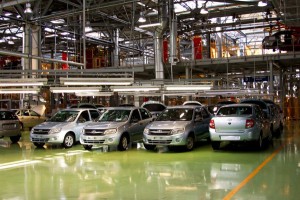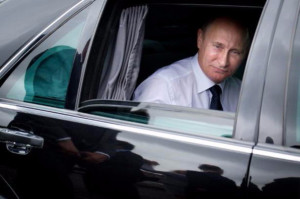
The news of the suspension of production at the major Russian car manufacturer AvtoVAZ in Togliatti, on the Volga River, neither comes as a surprise nor dominates the front pages. Considering the current economic situation this is quite logical: AvtoVAZ is not the first car maker in Russia to recur to this option. The Ford Sollers plant in Vsevolozhsk, the Volkswagen plant in Kaluga, Peugeot, Citroen, Mitsubishi, and other automobile manufacturers have suspended production at one time or another. It is obvious that even Putin’s KGB friend Sergei Chemezov, the current CEO of the Rostec state corporation that controls more than 700 machine building and defense plants in the country, including AvtoVAZ, cannot force Russia’s drastically impoverished population to buy new cars. It is also clear that the problem lies not with AvtoVAZ itself—whose Lada cars are world-famous for their low price and their simplicity—but with the overall crisis in the Russian economy that is suffering because of low oil prices and Western economic sanctions imposed in response to the military aggression against Ukraine.
Despite the assurances by Putin’s press secretary in early 2015 that “the fall in sales will be followed by a rapid growth,” the situation so far is the opposite. According to the Russian Auto Dealers Association, the automobile market has lost 40 percent of its model range in the last two years—and that is not the limit. Even the once-popular and inexpensive Ford Focus dropped out of the top 25 models sold in Russia, and the top rankings are now held by the cheapest cars that are two decades behind the 2016 European economy-class vehicles in terms of quality and technology. Even the sales of these “naked” cars are falling: according to Autoreview magazine, fewer cars are sold across all categories—Russian, Russian-assembled foreign, and imported.
The half-year statistics for 2016 collected by the European Business Association confirm this tendency: the sales of cars from all manufacturers are falling, including sales at the top of the range, which in Russia, traditionally, do not decline even during the times of crisis—or least decline insignificantly or after all the others. It seems that Russian state officials are not doing too well if the sales of their beloved Mercedes Benz have fallen by more than 15 percent in the first half of 2016—when, only a year ago, its new Maybach cars went like hot cakes.
The picture will not be complete without a mention of world markets that are showing significant growth at the very same time. In the U.S., the year 2015 broke historical records: more than 17,420,000 new cars were sold. In Germany, the figure was more than 3,200,000, while the European Union demonstrated a 10 percent growth. Even Ukraine that is battling Kremlin-supported separatists has been able to stabilize its economy, which was reflected in new car sales that have grown by nearly 40 percent between June 2015 and June 2016.
In Russia, 1,601,000 cars were sold in 2015. This figure was 35.7 percent lower than in 2014. The last year in which car sales grew was 2012. It is already clear that the current year will not bring good news: according to the most pessimistic forecasts by experts from the Higher School of Economics, the automobile market will decline by 30 percent in 2016 from the 2015 levels.

At such rate, there will soon come a day when not a single new car is sold in Russia. It is possible that even this news will go unnoticed by Russians, who are much more concerned about foreigners’ recognition of the might and importance of the great Russia than about their country’s actual economic performance. The strength of Putin’s empire lies in the heroes of war and sports, while mere mortals can walk on their feet from their television set to the cemetery.





